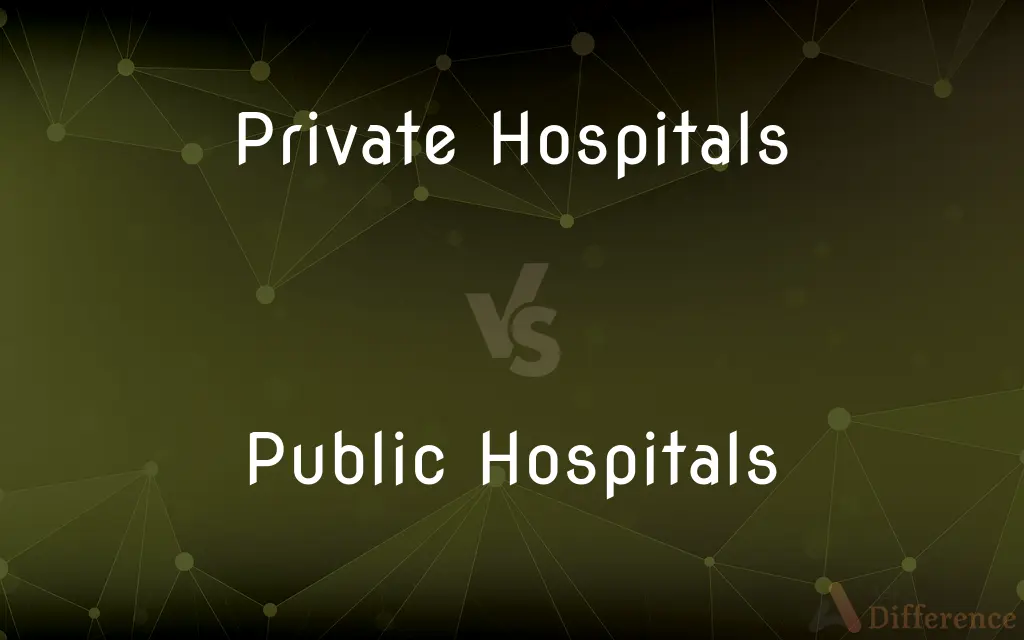Private Hospitals vs. Public Hospitals — What's the Difference?
Edited by Tayyaba Rehman — By Maham Liaqat — Published on March 8, 2024
Private hospitals are funded and operated by private entities, offering specialized services with a focus on patient comfort and choice. Public hospitals are government-funded, prioritizing accessibility and emergency care for the general population.

Difference Between Private Hospitals and Public Hospitals
Table of Contents
ADVERTISEMENT
Key Differences
Private hospitals operate on a for-profit basis, often providing a broader range of services and amenities, with an emphasis on patient comfort and shorter wait times for elective procedures. They rely on direct payments, insurance, and private funding. Public hospitals, funded by government sources, serve the wider community, focusing on providing essential health services to all individuals, regardless of their ability to pay, which can lead to longer wait times for non-emergency care.
The funding model for private hospitals allows for more investment in state-of-the-art technology and facilities, potentially offering higher quality care for certain conditions or treatments. Public hospitals, however, might have more limited resources but play a crucial role in public health emergencies, training healthcare professionals, and offering services to underserved populations.
Private hospitals often provide a more personalized healthcare experience, with more luxurious accommodations and services. This model can lead to higher healthcare costs for patients. Public hospitals emphasize equitable access, offering treatment to everyone, often leading to a more utilitarian approach to patient care and accommodations.
One key difference lies in the range of services and specialties offered. Private hospitals may focus on profitable specialties and elective procedures, while public hospitals maintain a broad range of services to meet public health needs, including emergency services, that might not be as profitable.
Despite these differences, both types of hospitals play integral roles in healthcare systems, with private hospitals offering choice and specialization for those who can afford it, and public hospitals ensuring that essential healthcare services are available to the entire population, regardless of financial status.
ADVERTISEMENT
Comparison Chart
Funding
Privately funded through direct payments and insurance
Government-funded
Access to Services
Often quicker for elective procedures
Prioritizes emergency and essential care
Patient Comfort
Typically offer more luxurious accommodations
More utilitarian accommodations
Cost
Generally higher due to specialized services
Lower or no cost to the patient
Service Range
May specialize in profitable services
Broad range of services, including comprehensive emergency care
Compare with Definitions
Private Hospitals
They are known for their focus on patient privacy, comfort, and a high level of customer service.
The private hospital provided a personal nurse to ensure her comfort during the stay.
Public Hospitals
Public hospitals are funded by government sources to provide healthcare to all, regardless of income.
The public hospital treated everyone in the emergency room, regardless of their ability to pay.
Private Hospitals
Costs at private hospitals can be higher, reflecting the personalized and specialized services offered.
The cosmetic surgery at the private hospital was expensive but included luxurious post-operative care.
Public Hospitals
Public hospitals play a key role in public health initiatives and education.
The public hospital hosted community health screenings and vaccination drives.
Private Hospitals
They often have shorter wait times for procedures, appealing to those who prioritize speed and comfort.
Her knee surgery was scheduled quickly at the private hospital.
Public Hospitals
They are essential for emergency care, often being the first point of contact in medical emergencies.
The trauma center at the public hospital was equipped to handle severe injuries around the clock.
Private Hospitals
Private hospitals might specialize in certain medical fields, providing advanced treatments.
The private hospital was renowned for its cutting-edge cancer care.
Public Hospitals
They may have longer wait times for elective procedures due to prioritizing urgent care.
His elective surgery was scheduled months out at the public hospital.
Private Hospitals
Private hospitals are healthcare institutions funded through private finance, offering patient-focused services.
The private hospital offered a private room and a wide menu of food choices.
Public Hospitals
Services are often provided at a lower cost to ensure accessibility for the entire population.
Her treatment at the public hospital was covered by the national health service.
Common Curiosities
Are public hospitals free?
While not always completely free, public hospitals aim to minimize or eliminate the cost to the patient, often through government funding or insurance.
Can anyone receive treatment at a private hospital?
Yes, anyone can receive treatment at a private hospital if they can afford the costs or have insurance coverage.
What is the main difference between private and public hospitals?
The main difference lies in their funding and operation, affecting accessibility, cost, and the range of services offered.
What role do public hospitals play in healthcare?
Public hospitals ensure that healthcare is accessible to everyone, particularly for emergency care, public health services, and serving underserved populations.
Do private hospitals provide better care than public hospitals?
Not necessarily; private hospitals may offer more comfort and specialized services, but public hospitals provide essential care to all, often including specialized and emergency services.
How do costs compare between private and public hospitals?
Private hospitals typically have higher costs due to specialized services and amenities, whereas public hospitals aim to be more affordable.
How do private and public hospitals affect healthcare accessibility?
Private hospitals can improve accessibility for those who can afford it, while public hospitals ensure essential services are available to all.
How do private and public hospitals contribute to healthcare costs?
Private hospitals may contribute to higher overall healthcare costs due to their services, while public hospitals aim to control costs through government funding.
Why do public hospitals often have longer wait times?
Public hospitals prioritize emergency and essential care, leading to longer waits for elective procedures due to higher patient volume.
Why are public hospitals important for emergency care?
Public hospitals are crucial for emergency care because they provide 24/7 services to all individuals, regardless of their financial situation.
Can private hospitals refuse treatment?
Private hospitals may refuse elective treatment based on ability to pay or insurance coverage, but laws often require them to stabilize patients in emergencies.
Why might someone choose a private hospital over a public one?
Individuals might choose private hospitals for shorter wait times, more luxurious accommodations, or access to specialized treatments.
What is the impact of hospital type on patient experience?
Patient experience can be more personalized and comfortable in private hospitals, while public hospitals focus on efficiency and accessibility.
Are the doctors better in private hospitals?
The quality of doctors can vary widely in both settings; many highly qualified physicians work in both private and public hospitals.
Do public hospitals offer any specialized services?
Yes, public hospitals often offer specialized services, especially in regions where private hospitals are not as prevalent.
Share Your Discovery

Previous Comparison
Content Writers vs. Journalists
Next Comparison
White Sugar vs. Caster SugarAuthor Spotlight
Written by
Maham LiaqatEdited by
Tayyaba RehmanTayyaba Rehman is a distinguished writer, currently serving as a primary contributor to askdifference.com. As a researcher in semantics and etymology, Tayyaba's passion for the complexity of languages and their distinctions has found a perfect home on the platform. Tayyaba delves into the intricacies of language, distinguishing between commonly confused words and phrases, thereby providing clarity for readers worldwide.














































